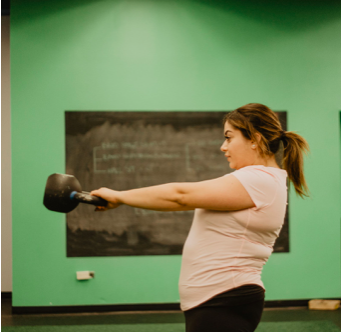You can’t prevent injuries (guest post from Megan Pomarensky)
You can’t prevent injuries.
We can hype movement screens and “correct movement dysfunctions” until the cows come home.
But let’s get something straight.
Accidents will happen.
Injuries are inevitable.
Unless your clients never do new or hard things, and stay far away from other people, vehicles, and objects, the odds are pretty good that one day, they’re going to have some sort of injury.
So what if instead of worrying about avoiding the inevitable, you train for it instead?
Here are 4 proven things you can do to minimize the intensity of an injury, and improve recovery.

1. Improve sleep quality to keep all body systems at their peak [for recovery, training, and life]. This can look like any number of things; limiting screen-time, alcohol and caffeine, adjusting your room temperature, creating a ritual to help you transition to a parasympathetic state, journaling to brain-dump all the thoughts floating around, meditation…you get the idea. The point is, if you treat sleep like a training modality – that is, plan for it, be intentional, and do everything in your power to set your clients up for success – they’ll notice an improvement in sleep..and therefore how they feel, train, and perform.
2. Find a stress management strategy that works [meditation, yoga, going for a walk, art, playing with a cute puppy or baby], because not only does more stress mean more sensitivity to pain (hi, cortisol and inflammation), but physical and mental health are directly linked. The human body doesn’t know the difference between types of stress. So if you’re piling cognitive/emotional stress onto some high-intensity or physically demanding activity (or vice versa), it can be easy to overload the body systems. Which makes the opposite true too. And overloading a system means recovery and performance decreases.
3. Move/train regularly in a bunch of different ways, so the body adapts [exposure therapy to increase tolerance applies in movement and exercise to improve tolerance, not just for being in the same room as a spider].

Train at high intensities.
Train in vulnerable positions.
Train to get in and out of positions.
Train the stuff you like to avoid.
Train for the life you want.
Adaptation happens based on exposure. aka –
The goal is lift heavy shit? Train that.
Bend further or reach higher? Train that too.
Feel better? Move more.
Be resilient? Get out of neutral and get uncomfortable.
4. Plan for self-care and recovery [overtraining is a real thing]. You gotta put the human first, and sometimes that’s going to be changing up that day’s training plan for an extra rest day or a fun non-gym adventure. This can be managed any number of ways…using data from apple, whoop, or similar watches…or by simply asking the client about their life outside the gym (sleep, relationships, stress, nutrition…even a straightforward “how are you?” goes a long way).
It’ll be worth it in the long-run. Promise.
These 4 points may seem straightforward…and you’re right; it is simple.
That doesn’t make it easy, though.
These concepts are very underestimated and undervalued in the training world, yet can make the biggest impact.
So let’s shift the narrative. Improve recovery, minimize injury, and perform better.
Which of the 4 tips can you start implementing today, with your clients (and yourself)?
Megan Pomarensky is a Certified Athletic Therapist, a Certified Functional Strength Coach and a Certified Vinyasa Yoga Instructor with a Master’s Degree in Rehabilitation Science.
Over the past 8 years, Megan has built a successful private clinical practice working with clients from professional athletes looking to improve performance to older adults with chronic pain, and everyone in between. Her mission is to empower every client to better understand their body and make informed decisions about their care.
She also helps athletic therapists, trainers and physiotherapists get out of the textbooks, protocols and checklists for better client results.
IG/Twitter @meganpomarensky
www.meganpomarensky.com